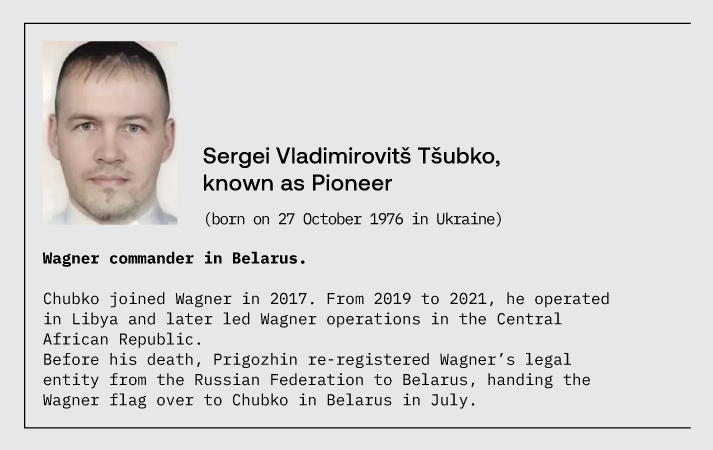1.4
Wagner Group’s relocation to Belarus
Lukashenka intervened in Prigozhin's uprising primarily to stabilise Putin's regime, which is directly linked to his own hold on power.
The deployment of Prigozhin's most loyal fighters to Belarus allowed Putin to rid himself of a contingent that was disloyal to him, shifting the responsibility for them onto Lukashenka's shoulders.
Wagner's presence likely does not pose a threat to internal stability in Belarus or to neighbouring countries.
After Prigozhin’s uprising, Lukashenka was prepared to accept some of the Wagner fighters in Belarus. He realised the need for swift action as Prigozhin’s activity could have jeopardised internal political stability in Russia, which, in turn, could have affected the foundations of his own regime. Between July and August 2023, approximately 5,000 Wagner fighters arrived in Belarus from Russia. This large influx of experienced and well-trained fighters came as an unpleasant surprise to Minsk, as Lukashenka had anticipated a smaller number.
The move allowed Moscow to achieve two significant victories. First, it enabled Moscow to eliminate an unwanted element since the Wagner fighters who went to Belarus were the most loyal to Prigozhin, refusing to enter into agreements with the Russian defence ministry and thus remaining outside state control. This made them even more unreliable from Moscow’s perspective, and they needed to be disposed of as quickly as possible. Second, the Wagner fighters became an internal matter for Belarus and a burden on Lukashenka’s shoulders as soon as they relocated to the country, while Putin distanced himself from the problem. With this move, Moscow likely sent a clear message to Minsk, especially given Putin’s irritation with Lukashenka’s media statements about how Belarus had saved Putin’s regime and Russia during Prigozhin’s uprising.
Lukashenko realised he lacked a good solution for the present or future situation of 5,000 Wagner fighters in Belarus. A makeshift tent camp was set up on the territory of an old missile brigade base in the Tsel area, where the Wagner fighters were accommodated. The Belarusian Armed Forces provided the camp residents with free food, drink and bathing facilities, but the Belarusian regime had no intention of paying salaries to the Wagner fighters. Moscow was even less interested in financing them.
A small group of Wagner fighters trained the Belarusian army and law enforcement agencies (KGB, internal troops and prison special forces) for a modest fee, sharing their experiences from the war in Ukraine. Another group of Wagner fighters sought to join the Belarusian private military company Gardservis, founded by Lukashenka’s aide and confidant Viktor Sheiman, who represents the president’s business interests primarily in Zimbabwe and aims to secure security service contracts in Africa for Gardservis. By the time the Wagner fighters arrived in Belarus, most of Gardservis’ personnel were already composed of Belarusian citizens, and the execution of foreign missions hinged on the possibility of securing service contracts in Africa. The majority of Wagner fighters received no compensation.

Prigozhin’s death on 23 August 2023 shocked Lukashenka. On the same evening, the Belarusian Security Council convened, the KGB special unit Alfa was put on alert, and there were disruptions in mobile internet service in the Tsel camp area. The service outage was likely a preemptive step to limit the spread of information about the circumstances of Prigozhin’s death and to avoid potential problems. Although the men in Belarus were Prigozhin’s most loyal fighters, his death is not known to have caused unrest in the Wagner camp in Tsel.
Wagner’s presence in Belarus likely does not threaten Lukashenka’s regime.
Wagner’s presence in Belarus likely does not threaten Lukashenka’s regime, as the state’s repressive apparatus is strong enough to maintain order and implement forceful security measures if necessary. Wagner fighters arrived in Belarus without heavy weapons and other heavy equipment. They were prohibited from freely leaving the Tsel camp or having any contact with local residents. Belarusian Special Operations Forces Command fighters guarded the camp, and the KGB’s Main Office of Military Counterintelligence was tasked with monitoring the situation at the base and its surroundings.
For similar reasons, Wagner’s presence in Belarus likely does not pose a threat to the security of neighbouring countries. In late July and early August, Wagner fighters were in the Brest and Gozha training areas near the borders of Poland and Lithuania. On the one hand, they trained Belarusian armed forces, but on the other hand, Lukashenka deliberately sought to disrupt and provoke his neighbours. This all happened in the context of an aggressive information and propaganda war, with Lukashenka claiming that Wagner fighters wanted to go on an “excursion” to the West and visit Warsaw. A swift and assertive response from Poland, Lithuania and Latvia (strengthening the borders with armed forces and closing border crossing points) surprised and alarmed Lukashenka. He ordered Wagner to withdraw from the country’s western borders to avoid further escalation. In the autumn of 2023, Wagner fighters were stationed in their camp in Tsel and provided training to Belarusian personnel at the Osipovitch training ground in the country’s central region.

As of the end of 2023, between 2,500 and 4,000 Wagner fighters were based in Belarus, and their fate and future remain unclear. Wagner fighters may pin their hopes on Lukashenka, but due to limited opportunities, only a small portion will likely find a role within the Belarusian state system, such as trainers or potential deployments to Africa. Allegedly, former Wagner commander Alexei Bergovin, also based in Belarus, is attempting to establish a new private military company in Belarus, primarily composed of Wagner fighters located in the country, and intends to lead it personally. Whether this plan will materialise is uncertain. Bergovin must consider that his plan depends entirely on Lukashenka’s willingness and readiness to fund a new private military company. If Bergovin assumes that Gardservis will find opportunities in Africa and that doesn’t happen, then Gardservis could become his biggest domestic competitor. In such a situation, Viktor Sheiman will likely leverage his close ties with Lukashenka to thwart Bergovin’s initiative. Conversely, considering the wave of protests following the 2020 presidential election, Bergovin could see an opportunity with the upcoming February 2024 Belarusian parliamentary election, and Lukashenka could use the new private military company as a tool of intimidation and control over the population. Bergovin has said: “In Belarus today, the world’s most formidable military force stands ready to bolster the army ahead of the 2024 elections … my sympathies to those who supported the ‘colour revolution’ in Belarus.”
For many Wagner fighters, entering into a contract with the Russian defence ministry is unacceptable; given their previous combat experience, entering into such an agreement would likely result in being sent back to the Bakhmut front line. Still, they do wish to earn a respectable salary and survive, so they are likely to seek opportunities in Africa outside of Gardservis and with financing from Russia. Whether and in what form this might materialise remains uncertain. On 19 July 2023, Prigozhin confirmed during a meeting in Belarus with Wagner fighters that African missions would continue and that they could participate. A month later, Prigozhin was dead, and with him, the guarantee of those promises disappeared.